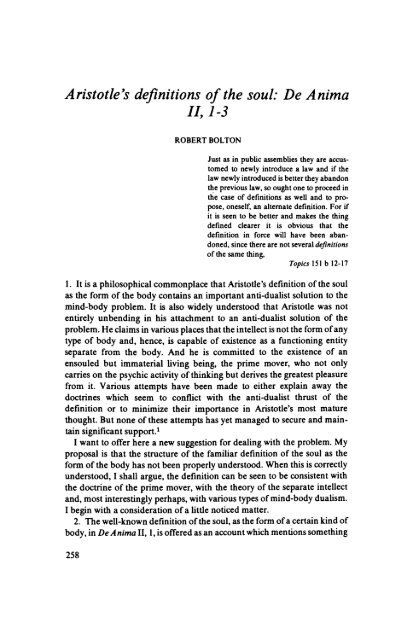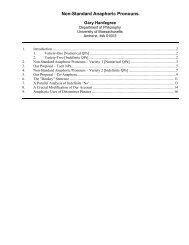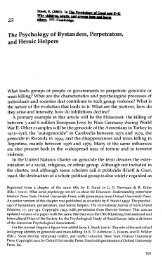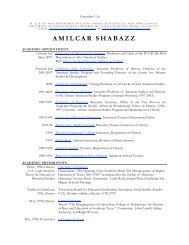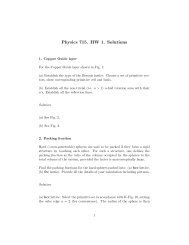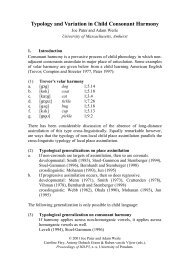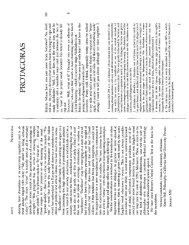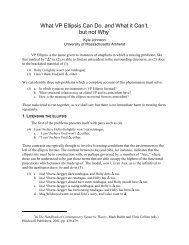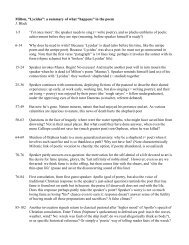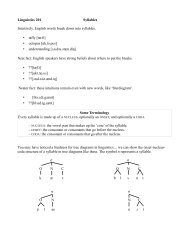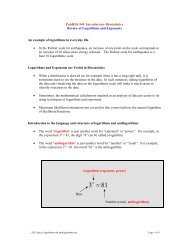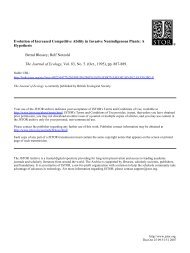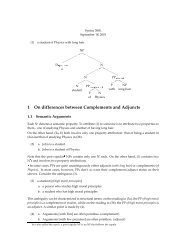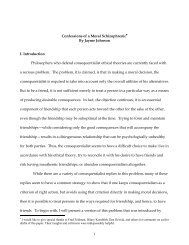Aristotle's Definitions of the Soul: "De Anima" ii, 1-3
Aristotle's Definitions of the Soul: "De Anima" ii, 1-3
Aristotle's Definitions of the Soul: "De Anima" ii, 1-3
Create successful ePaper yourself
Turn your PDF publications into a flip-book with our unique Google optimized e-Paper software.
<strong>Aristotle's</strong> definitions <strong>of</strong> <strong>the</strong> soul: <strong>De</strong> A nima<br />
II, 1-3<br />
ROBERT BOLTON<br />
Just as in public assemblies <strong>the</strong>y are accustomed<br />
to newly introduce a law and if <strong>the</strong><br />
law newly introduced is better <strong>the</strong>y abandon<br />
<strong>the</strong> previous law, so ought one to proceed in<br />
<strong>the</strong> case <strong>of</strong> definitions as well and to propose,<br />
oneself, an alternate definition. For if<br />
it is seen to be better and makes <strong>the</strong> thing<br />
defined clearer it is obvious that <strong>the</strong><br />
definition in force will have been abandoned,<br />
since <strong>the</strong>re are not several definitions<br />
<strong>of</strong> <strong>the</strong> same thing,<br />
Topics 151 b 12-17<br />
1. It is a philosophical commonplace that <strong>Aristotle's</strong> definition <strong>of</strong> <strong>the</strong> soul<br />
as <strong>the</strong> form <strong>of</strong> <strong>the</strong> body contains an important anti-dualist solution to <strong>the</strong><br />
mind-body problem. It is also widely understood that Aristotle was not<br />
entirely unbending in his attachment to an anti-dualist solution <strong>of</strong> <strong>the</strong><br />
problem. He claims in various places that <strong>the</strong> intellect is not <strong>the</strong> form <strong>of</strong> any<br />
type <strong>of</strong> body and, hence, is capable <strong>of</strong> existence as a functioning entity<br />
separate from <strong>the</strong> body. And he is committed to <strong>the</strong> existence <strong>of</strong> an<br />
ensouled but immaterial living being, <strong>the</strong> prime mover, who not only<br />
carries on <strong>the</strong> psychic activity <strong>of</strong> thinking but derives <strong>the</strong> greatest pleasure<br />
from it. Various attempts have been made to ei<strong>the</strong>r explain away <strong>the</strong><br />
doctrines which seem to conflict with <strong>the</strong> anti-dualist thrust <strong>of</strong> <strong>the</strong><br />
definition or to minimize <strong>the</strong>ir importance in <strong>Aristotle's</strong> most mature<br />
thought. But none <strong>of</strong> <strong>the</strong>se attempts has yet managed to secure and maintain<br />
significant support.'<br />
I want to <strong>of</strong>fer here a new suggestion for dealing with <strong>the</strong> problem. My<br />
proposal is that <strong>the</strong> structure <strong>of</strong> <strong>the</strong> familiar definition <strong>of</strong> <strong>the</strong> soul as <strong>the</strong><br />
form <strong>of</strong> <strong>the</strong> body has not been properly understood. When this is correctly<br />
understood, I shall argue, <strong>the</strong> definition can be seen to be consistent with<br />
<strong>the</strong> doctrine <strong>of</strong> <strong>the</strong> prime mover, with <strong>the</strong> <strong>the</strong>ory <strong>of</strong> <strong>the</strong> separate intellect<br />
and, most interestingly perhaps, with various types <strong>of</strong> mind-body dualism.<br />
I begin with a consideration <strong>of</strong> a little noticed matter.<br />
2. The well-known definition <strong>of</strong> <strong>the</strong> soul, as <strong>the</strong> form <strong>of</strong> a certain kind <strong>of</strong><br />
body, in <strong>De</strong> Anima II, 1, is <strong>of</strong>fered as an account which mentions something<br />
258


